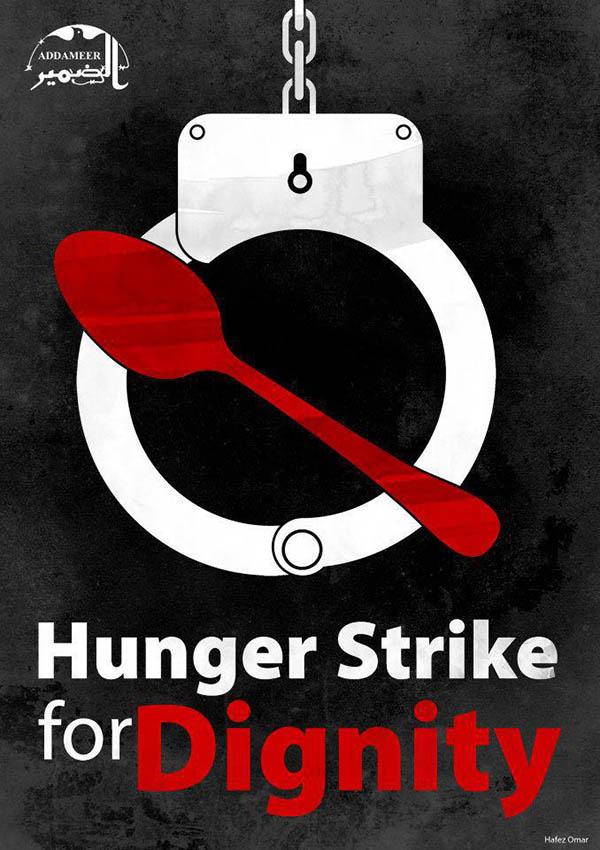
Palestine: Hunger Strike Continues Despite “Israeli” Abuse, AI Condemns “Israeli” Brutality
Palestinian prisoners continue fighting for their right from behind the bars. Four Palestinian political prisoners currently imprisoned in "Israeli" military jails under administrative detention orders continue their hunger strikes despite deteriorating health conditions and abuse by "Israeli" soldiers, a joint press release of the Addameer Prisoner Support and Human Rights Association, al-Haq, and Physicians for Human Rights revealed.
 The Palestine News Network (PNN) reported Wednesday that Samer Al-Barq, and Hassan Safadi are of particular concern to the human rights groups both because of their deteriorating health caused by the hunger strikes and the abuse suffered at the hands of "Israeli" soldiers.
The Palestine News Network (PNN) reported Wednesday that Samer Al-Barq, and Hassan Safadi are of particular concern to the human rights groups both because of their deteriorating health caused by the hunger strikes and the abuse suffered at the hands of "Israeli" soldiers.Both were visited by a lawyer and a physician on August 5th and 2nd respectively. Al-Barq is on the 79th day of his hunger strike, which followed a previous strike of 30 days.
According to Addameer lawyer Fares Ziad, when the two men were being transferred from Ramelh to Ofer military court, the Special Forces soldiers ordered Mr. Al-Barq to walk. When he told them he could not, they beat his legs. When they eventually brought a wheelchair, he was forced to crawl to it and wheel it himself as he was offered no help.
Ziad also told of a similarly cruel series of incidents relating to Mr. Safadi who is being held in an isolation cell with nothing but his clothes. He told the lawyer that his cell is searched three or four times a day violently, tearing up his bedding, and on one occasion, he was insulted and beaten by soldiers, leaving one of his legs injured.
The two men are now being held together in this cell which measures 5 feet by 6 feet and has no windows or ventilation.
There are nearly 2,000 prisoners on hunger strike, and that number is rising despite the - disappointingly modest - popular and official responses to the crisis.
According to the latest information received from the "Israeli" prisons, more than 15 prisoners so far have been transferred to "Israeli" hospitals due to health complications from their hunger strikes. Many of these prisoners are now in critical condition from their hunger strikes, which have lasted over 60 days.
For its part, Amnesty International stated that "Israeli" authorities must investigate ill-treatment of Palestinian prisoners while in detention.
"While they are barely able to stand and use wheelchairs for their daily needs, guards have repeatedly beaten and verbally abused them while in detention at the Israel Prison Service Medical Centre in the central city of Ramleh," the report said.

"The Israeli authorities must release Hassan Safadi, Samer al-Barq and all other administrative detainees, unless they are promptly charged with recognizable criminal offences and tried in accordance with international fair trial standards," said Ann Harrison, Amnesty International's Deputy Director for the Middle East and North Africa.
Detainees can be held in administrative detention without charge or trial for periods of up to six months which can be renewed indefinitely. "Israel" has used the measure against its citizens since 1948. Thousands of Palestinians from the occupied Palestinian territories have been subjected to it since 1967.
Administrative detainees - like many other Palestinian prisoners - have been subjected to violations such as the use of torture and other ill-treatment during interrogation, as well as cruel and degrading treatment during their detention, sometimes as punishment for hunger strikes or other protests.
In addition, administrative detainees and their families must live with the uncertainty of not knowing how long they will be deprived of their liberty and the injustice of not knowing exactly why they are being detained.
Like other Palestinian prisoners in "Israeli" custody, they have also faced bans on family visits, forcible transfer or exile and solitary confinement.
Source: News Agencies, AI, edited by moqawama.org



